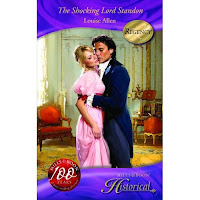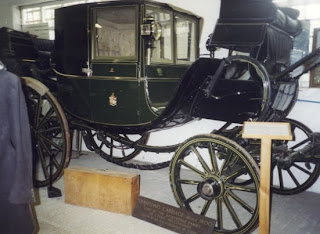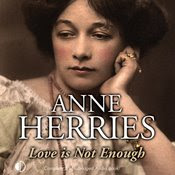
The third of my Those Scandalous Ravenhursts series is out this month with the story of Gareth Morant, Earl of Standon, a most respectable gentleman –up to a point. Saving his childhood friend Lady Maude Templeton from having to marry him – something they both wish to avoid – Gareth sets out to become every father’s nightmare of a son-in-law by setting up a dashing, and very visible mistress. In this extract, Gareth is about to find her –
In sensation novels, the sort governesses are supposed never to read and in fact devour by the shelf full, the beleaguered yet valiant heroine can pick a dungeon lock in seconds as she escapes from the wicked duke’s evil clutches. Her hands shaking, cold sweat standing out all over her, Jessica could only conclude that either wicked dukes employed inferior locksmiths to brothel keepers or the authors of the Minerva Press were sadly misinformed.
After five minutes she stood up in an attempt to relieve her cramped knees. ‘Open, you beastly thing,’ she said, almost weeping with frustration, and fetched the lock a thump with her clenched fist. With a click it did just that.
Jessica was out into the corridor before she could think. Opposite her a shadowy figure moved. She gave a yelp of fear and realised that it was her own reflection in a full length mirror. And she was stark naked.
Behind her the door swung to, the catch snicked closed. She could not go back, that was where they would come for her. Clothes. That was the priority. Like this she had no hope, and she was finding it very hard to think clearly. One of these rooms, surely, must contain something she could wear.
She opened the first door that she came to and peered round the edge. Inside was a big bed and on it a welter of naked flesh. Gasping, Jessica made out six legs, two pairs of buttocks, a glimpse of hairy chest… How many people? Doing what? She shut the door, flattening herself instinctively into the recess. The participants in the orgy had appeared totally preoccupied, but even so, she did not think she had the courage to sneak in and steal clothing while that was going on.
It was ridiculous to feel even more alarmed and fearful than she was already – how much worse could her predicament possibly get? - but that glimpse into carnal matters beyond her comprehension had shocked her out of any delusion that this was a nightmare. There, for real, was what she risked becoming if she could not escape.
Jessica drew in a deep breath and forced herself to plan. To assume the worst was a self-fulfilling prophesy. Her fate was sealed if she panicked. Steadier, she surveyed the corridor in which she found herself. Opposite was the door she had just escaped through, behind her the room with the orgy in progress. On either side were two more doors and then in both directions, the passage turned. More cautious now, she applied an ear to each door in turn and from each came the sounds of gasps and sighs, and from one, the crack of a whip.
Which way to go? Her sense of direction had quite deserted her in the hectic few minutes when she had been bundled out of the carriage and up the stairs. Then, as she hesitated, her arms wrapped around her chilly ribs, the decision was made for her by the sound of a door opening and loud voices from out of sight to her right. Without hesitation Jessica fled around the other corner.
It might have been better, she realised in the second she thudded into a solid wall of male muscle, if she had been looking where she was going and not wildly back over her shoulder.
Her nose was buried in a shirt front, the crisp upper edge of a tailored waistcoat stuck into her chin and her shivering body was pressed against warm superfine and knitted silk. The immovable object stood quite still as the voices behind her grew louder.
Jessica tilted back her head and found she was squinting up past a chin that was already shadowed by an evening beard into amused grey eyes. One dark eyebrow rose. ‘Help,’ she whispered, her voice fled along with her hope. ‘Please help me.’
 A couple of years ago, my sister treated me to a long weekend in Derbyshire. We don't do it very often, but it's always lovely to spend time together on our own. One of the fascinating places we visited was the Red House Stables Working Carriage Museum. It was in the middle of winter and as we were the only people there that afternoon, we were able to really explore the place and completely monopolise one of the lovely staff who told us all about the adventures they'd had working in lots of t.v. and film. I was especially interested to hear that some of the carriages had been used for the 1996 adaptation of Pride and Prejudice, starring Jennifer Ehle and Colin Firth. I loved the striped interior of the carriage below, which had been left in its original state. Can you just imagine being driven around whilst sitting on pink striped glazed chintz!
A couple of years ago, my sister treated me to a long weekend in Derbyshire. We don't do it very often, but it's always lovely to spend time together on our own. One of the fascinating places we visited was the Red House Stables Working Carriage Museum. It was in the middle of winter and as we were the only people there that afternoon, we were able to really explore the place and completely monopolise one of the lovely staff who told us all about the adventures they'd had working in lots of t.v. and film. I was especially interested to hear that some of the carriages had been used for the 1996 adaptation of Pride and Prejudice, starring Jennifer Ehle and Colin Firth. I loved the striped interior of the carriage below, which had been left in its original state. Can you just imagine being driven around whilst sitting on pink striped glazed chintz!















